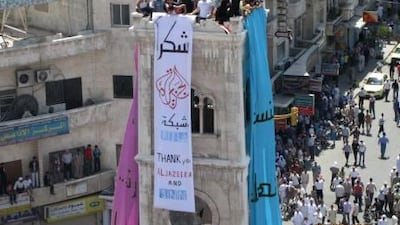DAMASCUS // Syria's uprising entered its fifth month yesterday, with at least 28 people killed and activists claiming more than a million demonstrators took part nationwide in one of the largest Friday protests yet.
Security forces opened fire using live ammunition, killing and seriously wounding scores of protesters, according human-rights monitors. There were deaths in Homs, Idleb, Deraa and the Damascus suburbs of Douma and Qaboun.
The largest gatherings took place in the central city of Hama, where some 500,000 protesters staged a rally - more than half of the city's population - and the eastern desert city of Deir Ezzor, where more than 250,000 demonstrators marched, activists said.
Turnout in Deir Ezzor increased dramatically from last Friday when 75,000 protested, apparently as a result of two protesters being shot dead there by security forces on Thursday.
Demonstrations also took place in Douma, Rastan and Deraa, all areas that have seen sustained military crackdowns in recent months. One of yesterday's protests even began at the Omari mosque in Deraa's Old City, according to activists, the uprising's place of origin and site of the first anti-protest military assault.
"We have completed four full months of demonstrations and things have come full circle, Deraa and the Omari mosque are involved again," said an independent Syrian analyst, speaking on condition of anonymity. "It clearly symbolises that everything the regime has done to stamp out the uprising has failed. Their policies are in crisis, they have no answer to this."
In its account of yesterday's protests, Syrian state-run media painted a vastly different picture, insisting that the number of protesters was sharply down on previous weeks. Officials have been repeating a slogan that "Syria is fine", echoing a sound bite made by President Bashar Al Assad in a speech last month.
Government sources claimed one security officer was killed in Homs and others wounded by protesters throwing stones.
The violence in Qaboun - as many as a dozen people were shot there yesterday, civil rights campaigners said - comes as the district is due to host a groundbreaking opposition meeting today.
A working-class neighbourhood in north-eastern Damascus with a large Palestinian population and many immigrants from the northern province of Idleb, Qaboun has seen large, well-organised daily protests for weeks, despite being home to a large military base.
Yesterday more than 15,000 demonstrated in Qaboun, with protesters providing their own security cordons around government-owned property, according to residents, in order to stop any vandalism.
Official security forces were pulled to the outskirts and the demonstrations began with a festival like atmosphere, complete with
music, singing and balloons - until the shooting started.
"Peaceful protests have been getting bigger and bigger in Qaboun, they used to have 20 or 30 security officers waiting outside the mosque to intimidate the few demonstrators but now the protesters have taken over on Fridays," said one resident.
He speculated that yesterday's shootings were intended as a warning about the planned opposition meeting.
Billed as a National Salvation Council, the gathering - if it goes ahead - would be the first public political meeting to take place in a demonstration hot spot, and the first to openly involve members of Local Coordination Committees (LCCs).
The LCCs have emerged as a muscular grassroots political force, capable of bringing tens of thousands of protesters out onto the streets. Until now these organisations have remained underground out of fear of persecution, with security forces arresting their members.
Meshaal Tammo, a leading opposition activist and key figure in putting together the National Salvation Council meeting, said today's meeting would add to pressure on the authorities.
"The opposition must keep moving forward," he said in an interview on Thursday. "There have been opposition meetings now in Damascus but we want to go further and include the young demonstrators and the LCCs, they are the driving force of the uprising and they need to be represented in political discussions."
Other leading dissidents involved in the Salvation Council meeting include Haithem Al Maleh, a former judge and one of Syria's most prominent human-rights campaigners. He has said the aim of the council is to propose a government-in-waiting, in effect an alternative administration to the current Syrian regime.
"The regime will not endure forever and we must prepare for what comes after it, we should think about putting forward and alternative," said Mr Tammo. "It may not be perfect but it will be an important step forward if we can do that."
It remains unclear if the meeting will go ahead because organisers have not asked for, and have not received, official permission to hold it.
"I can't see the authorities will allow it to happen because it would be the most brazen challenge to their authority yet," said one leading dissident, on condition of anonymity. "It will include protesters and will name a shadow government, if we can take that step it will be very significant."
Protests on Wednesday, Thursday and yesterday, and the deadly security response to them, appeared to have further undermined a regime-orchestrated National Dialogue convention that took place this week, and was already emaciated by an opposition boycott.
"If you wanted to see how serious the regime was about dialogue and a political solution, you only have to look at the way the security forces are behaving to see the talks are an illusion," said Fayez Sara, a dissident who like other opposition figures had refused to participate in the national dialogue conference.
More than 1,400 protesters have been killed since March, with thousands more wounded and arrested according to human-rights groups and activists. Those figures are refuted by the authorities, who say that more than 400 security personnel have been killed by "armed groups" since the crisis began.
psands@thenational.ae

